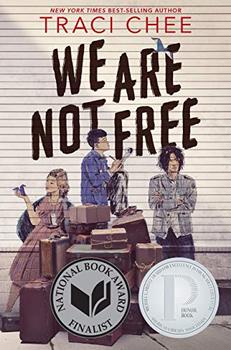Summary | Excerpt | Reading Guide | Reviews | Beyond the Book | Readalikes | Genres & Themes | Author Bio

I
We Never Look Like Us
Minnow, 14 March 1942
It's been over three months since the attack on Pearl Harbor, and my oldest brother, Mas, has told me to come straight home from school each day. Take the bus, he says. No loitering around, he says. I mean it, Minnow.
I used to love walking back to the apartment in the afternoons, seeing all the interesting things going on in the city: bodies being excavated at Calvary Cemetery, buildings going up in empty lots, chattering kids coming out of Kinmon Gakuen, the old Japanese language school.
But that's been closed since last December, when it became the Civil Control Station, because Pearl Harbor changed everything for us. We have a new eight-p.m. curfew. People are starting to talk about involuntary evacuation. And Mas has warned me not to get caught out alone. Don't do anything that'll make them come down on you, he says. Don't give them any excuse.
And I haven't.
Until today.
I don't know what happened. I was walking out of George Washington High School, headed for the bus stop like always, when I saw the football team practicing on the field, racing back and forth across the grass with the red towers of the Golden Gate Bridge rising beyond the school building like a promise, and before I knew it, I was sitting in the bleachers with my sketchbook in my hands and my butt going numb on the concrete.
Oops.
I'm so panicked, I gather up my sketchpad and bolt right past the bus stop, hoping to make it home before Mas gets back from work.
No matter how many times I try to explain it, he never understands. Sometimes I get so wrapped up in a drawing that I get transported onto the paper, and the charcoal suspension cables and pencil players become more real to me than the bleachers or the grass or the school, and when I come back to my body, it's hours later, everyone's gone, and I'm walking home alone as fog cascades into the bay.
I know it'd be faster if I waited for a bus, but I'm afraid if I hang around at one of the stops, someone will chase me off, or call me "Jap!" or worse. So I keep walking, and buses keep passing me while I'm between stops, and I keep thinking I should just wait at the next one, but . . .
Mas says that's my problem—there's always something going on inside my head, but I never think.
My middle brother, Shig, likes to tell him it's because my head's up in the clouds, where it doesn't do me any good.
I'm still walking, trying to decide if I should keep going or try waiting, when I catch sight of a flyer for Sutro Baths in a drugstore window, and I stop cold. For a second, all I can think is, Mas was right. I don't think.
I should've gone straight home. I should've waited for a bus. I shouldn't be out like this. Because it's dangerous to be hanging around with a face like mine, three months into the war.
It was a Sunday in December, and we were getting ready for lunch when Mas asked Shig to turn on the radio and we all heard the news that Japan had attacked Pearl Harbor.
Mom's face went taut and white as a sheet. If I was going to draw her the way she looked then, I'd draw her with thin lips and frightened eyes, pinned to a clothesline, her body flapping in the wind of a passing Nakajima B5N bomber.
We've never been allowed inside Sutro Baths, but I used to draw it from the park at Lands End (the glass ceilings, the rough water, the tide-eaten cliffs), imagining what it was like inside those glinting cupolas: the smell of salt water and wet concrete, every sound in that echoing space a slap.
Now I kind of wish the whole thing would slide into the Pacific.
The ad says GET IN TRIM FOR FIGHTING HIM! and in the center there's a drawing of a Japanese soldier with diagonal slits for eyes, nostrils like watermelon seeds, and two big square teeth jutting out over his lower lip.
Excerpted from We Are Not Free by Traci Chee. Copyright © 2020 by Traci Chee. Excerpted by permission of Houghton Mifflin Books For Younger Readers. All rights reserved. No part of this excerpt may be reproduced or reprinted without permission in writing from the publisher.
Your guide toexceptional books
BookBrowse seeks out and recommends the best in contemporary fiction and nonfiction—books that not only engage and entertain but also deepen our understanding of ourselves and the world around us.